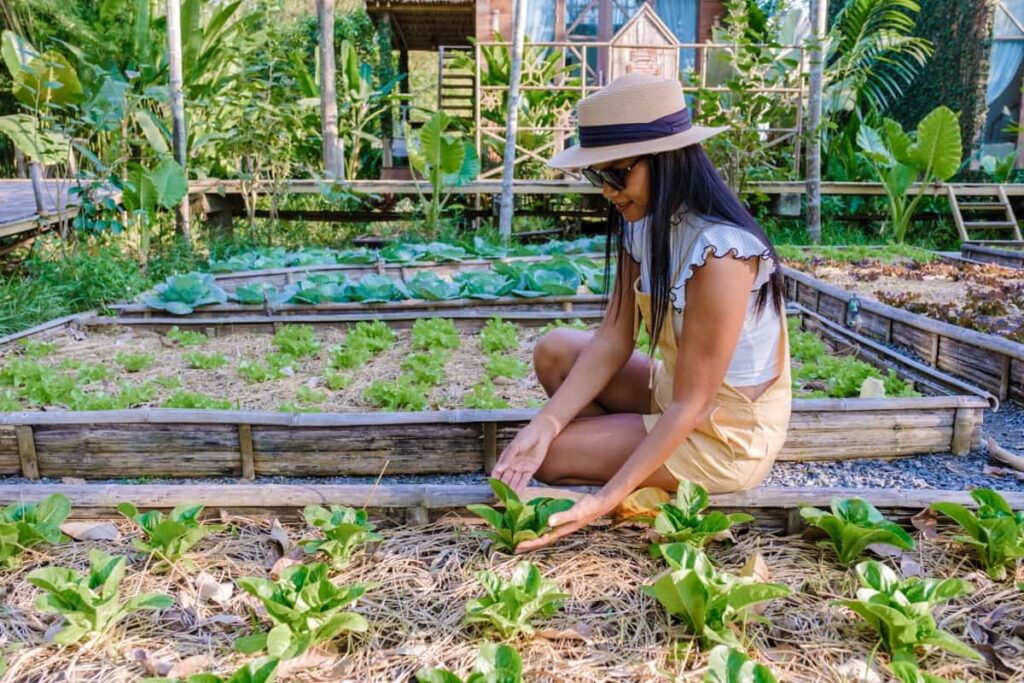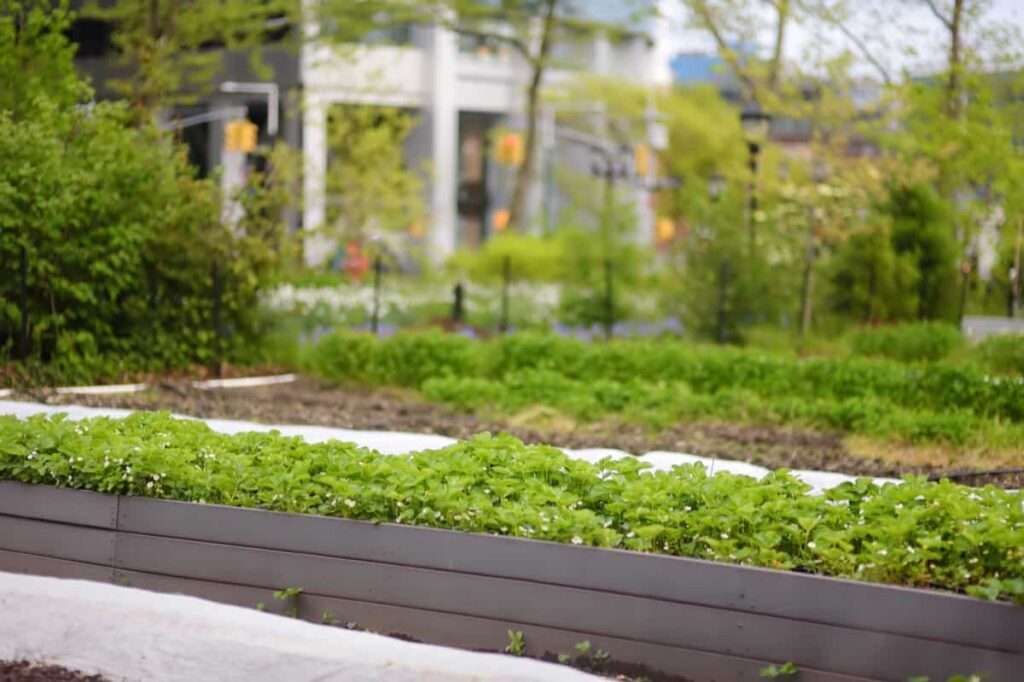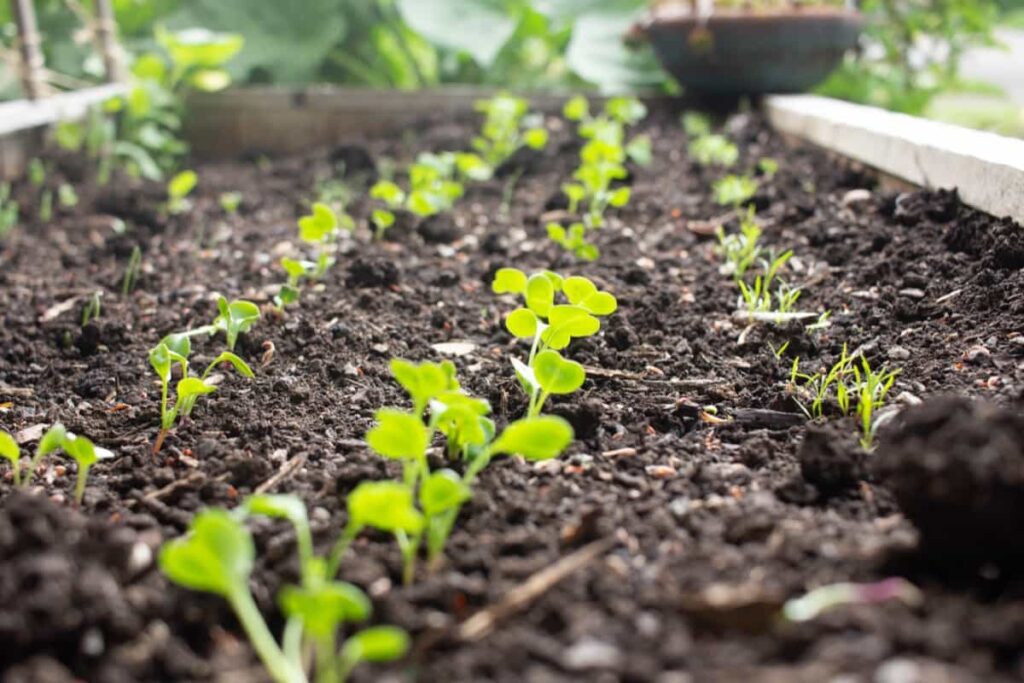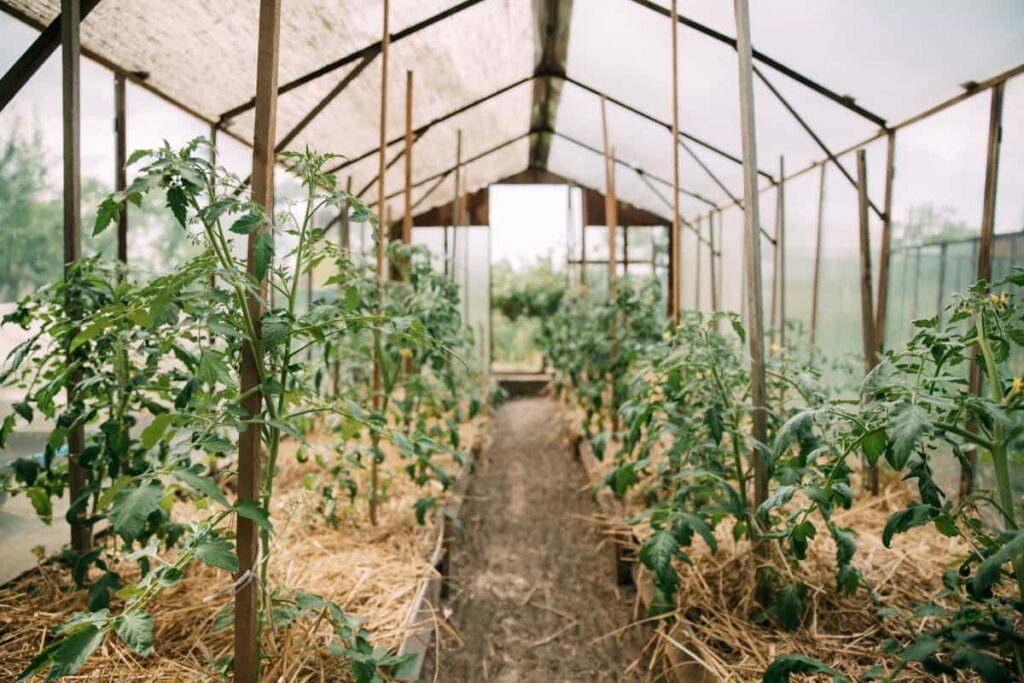Fertilizing your raised bed garden can make all the difference in plant growth, health, and productivity. You can ensure a bountiful harvest by giving your plants the necessary nutrients to grow healthy and strong.

Best Fertilizers for Raised Bed Garden
What is a Raised Bed Garden?
- A raised bed is a type of gardening involving planting beds elevated above the ground. These beds can be made from various materials such as wood, stone, or concrete blocks.
- Raised bed gardens offer several advantages over traditional gardens. Firstly, they provide better drainage for plants which helps to prevent root rot and other water-related issues. Additionally, because the soil is contained within the raised bed, it’s easier to control the quality of the soil and add nutrients as needed.
- Raised bed gardens are also ideal for those with limited place, as they can be built in small areas such as patios or balconies. Raised bed gardening offers many benefits over traditional gardening methods and is an excellent choice for anyone looking to grow fruits and vegetables at home.
Should I Fertilize My Raised Bed Garden?
- Fertilizing your raised bed garden is important in ensuring plants get all the nutrients they need to grow healthy and strong. While some gardeners may argue that adding compost or other organic matter is enough, fertilizer can boost essential nutrients lacking in the soil.
- Another factor to consider is the soil quality in your raised bed. If you use fresh soil or have poor-quality soil, adding fertilizer can improve your plants’ nutrient content and overall health.
- On the other hand, if you’ve been consistently adding organic matter to your raised bed over time, you may not need additional fertilizer.
- Inorganic fertilizer is made from chemicals and minerals, while organic fertilizer comes from natural sources like compost, manure, or worm castings. Whichever type you choose, selecting the right amount of nutrients is important based on your plant’s needs.
In case you missed it: Roma Tomato Growing Guide: For Pots, Ground, Raised Beds, and Buckets

Best Fertilizers for Raised Bed Gardens
- Choosing the right fertilizer is crucial when growing a successful raised bed garden. The best fertilizers for raised bed gardens are generally organic and rich in nutrients that support plant growth.
- One popular option is compost, which adds nutrients and helps improve soil structure and water retention. Another great choice is worm castings, which are high in beneficial microorganisms that aid in nutrient absorption by plants.
- For those who prefer store-bought fertilizers, many options are specifically formulated for raised bed gardens. Look for products containing balanced nitrogen, phosphorus, potassium (NPK), and micronutrients like calcium and magnesium.
- It’s important to read labels carefully and choose a fertilizer suitable for the types of plants you’re growing in your raised beds. Some vegetables may require more or less of certain nutrients than others.
Is Fertilizer Necessary for a Raised Bed Garden?
Fertilizers are a crucial aspect of raised bed gardening. They provide essential nutrients that your plants need to grow healthy and strong. When selecting the right fertilizer for your garden, consider the soil type and the specific nutrient needs of your plants.
In case you missed it: How to Grow Eggplants in Raised Beds: Step-by-Step Guide to Planting and Care

When To Apply Fertilizer to a Raised Bed Garden?
- The key to successful fertilization is timing; applying fertilizer at the right time ensures optimal plant uptake when needed. Regular fertilizer application throughout the growing season helps maintain continuous plant growth and optimum yields.
- Knowing when to apply fertilizer to your raised bed garden is crucial in ensuring your plants’ proper growth and development. Once you’ve prepared your soil, it’s recommended that you wait at least 2 weeks before applying any fertilizer.
- Before applying fertilizer, test the pH levels in your soil with a home testing kit.
- Generally, it’s best to apply fertilizer during periods of active plant growth rather than during periods of dormancy or stress. This means fertilizing early in the spring when plants are starting to grow and again mid-season as they continue to develop.
- It’s important not to over-fertilize the plants, as this can lead to burned roots and leaves or stunted growth. Follow instructions on package labels carefully, considering factors such as rainfall frequency and intensity.
- To ensure the health of your raised bed garden, it’s important to fertilize regularly. A balanced fertilizer must be applied every 3 to 4 weeks throughout the growing season for optimal results.
How Much Fertilizer Do I Require for a Raised Bed?
- The fertilizer amount you need depends on the size of raised bed garden and the type of plants you’re growing.
- A general rule is to use 2 to 3 pounds of fertilizer for every about 100 square feet of garden area. This will ensure your plants have enough nutrients without overloading them with too much fertilizer.
In case you missed it: Inexpensive Raised Bed Garden Ideas: Cheap Budget Tips and Techniques

How to Apply Fertilizer to a Raised Bed Garden?
- You’ll want to ensure your soil is moist before adding any fertilizer. This will help the essential nutrients in the fertilizer distribute evenly throughout the soil.
- Next, read and follow the instructions on your chosen fertilizer product carefully. Some fertilizers must be mixed with water before application, while others can be applied directly onto the soil surface.
- Once you’ve prepared your fertilizer according to its instructions, apply it evenly over the top of your raised bed garden using either a handheld spreader or by hand. Remember not to apply too much fertilizer, as this can damage plants and harm beneficial microorganisms in the soil.
- After applying fertilizer, water your garden thoroughly so that nutrients can penetrate the roots of plants and reach deeper layers of soil where they’re needed most. It’s also important to monitor your plants for signs of nutrient deficiencies or excesses and adjust future applications accordingly. With proper care, your raised bed garden will thrive thanks to regular applications of well-timed fertilizers.
- It’s important not to overdo it with fertilizer. Applying too much can harm your plants by burning their roots or causing excessive growth, leading to weaker stems.
In case you missed it: How to Start Organic Garden from Scratch at Home: For Terrace, Pots, Raised Beds, and Indoor

Conclusion
Fertilizer in raised bed gardens is important in plant growth and development. It provides essential nutrients for plants to thrive, especially in raised bed gardens where soil quality is often poor. Without proper fertilization, your raised bed garden can suffer from nutrient problems, leading to stunted growth, reduced yield, and disease susceptibility.
- Budget Friendly Sheep Shed Ideas: Cheap and Low-Cost Tips
- How Much Do Cattle Farmers Make: Revenue Streams in Cattle Farming
- Management Pests and Diseases in Your Cotton Field
- Sheep Farming Business Plan for Beginners
- Aquaponic Farming at Home: A Step-By-Step Guide
- Profitable Village Farming Business Ideas in 2024
- High-Yield Aquaculture: Fast-Growing Fish for Farming
- Effective Fish Pond Construction Techniques for Beginners
- Irrigation and Water Management in Pineapple Farming
- Blossom to Harvest: Mastering Flowering and Pollination in Papaya Farming
- Pig Fattening Essentials: From Selection to Sale for Beginners
- Raising Wagyu Cattle: A Complete Guide for Premium Beef Production
- Soil Types and Their Water Holding Capacity
- Optimizing Irrigation Schedules for Coconut Groves for Enhanced Yield
- Espresso Your Garden: Coffee Grounds for Healthier Acid-Loving Plants
- The Best Soil Mix for Snake Plants: How to Mix Your Own Snake Plant Soil
- Green Thumb Success: Expert Tips for Cultivating Greenhouse Beans All Year Round
- Bloom All Year Round: The Ultimate Guide to Indoor Hyacinth Care
- Eco-Friendly Gardening: How to Make Liquid Fertilizer from Kitchen Waste
- Ultimate Guide to Grow Anise in Pots: Explore Seed Propagation to Harvesting
- Guide to Raising Chester White Pigs: Discover Breed Facts to Growth Management
- Mastering the Elegance: The Ultimate Guide to Weeping Cherry Tree Care, Planting, and Maintenance
- Ultimate Guide to Planting Garlic in Grow Bags: Growing Strategies for Beginners
- How to Fix Spider Plant Leaf-Related Problems: Natural and Organic Remedies
- 10 Reasons Why Your Tulsi Plant is Shedding Leaves: Home Remedies and Solutions
- Optimizing Growth and Yield: The Advantages of Palm Bunch Ash Fertilizer
- Utilizing Neem Oil Extract as a Natural Pesticide for Hydrangea
- From Soil to Harvest: Various Ways in Which Farmers Can Use AI Tools
- Steps to Encourage and Induce Citrus Flowers: A Comprehensive Guide
- How to Fix Snake Plant Leaf-Related Issues: Natural and Organic Remedies
- Transform Your Garden into a Fragrant Oasis with Raat Ki Rani (Night Blooming Jasmine)
- Discover the Ideal Chicken Breeds for Philippine Farms
- How to Create a Poultry Egg Farm Business Plan for Profits
- Grow Lemon Cucumbers Like a Pro: Insider Techniques for Bountiful Yields
- Ultimate Guide to Caring for Your Pink Princess Philodendron: Tips for Thriving Variegation
- Areca Nut Profit Per Acre: Calculating Yield and Cost of Cultivation
